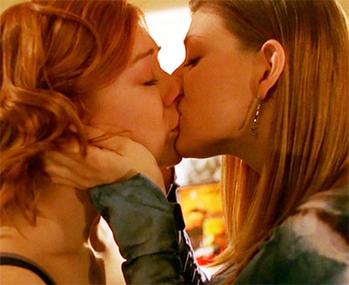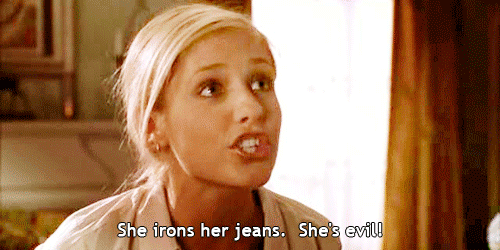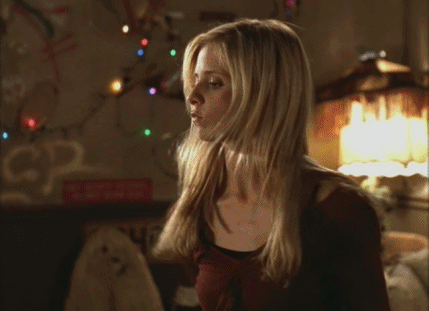In honor of its 20th anniversary, I feel I need to pay tribute to one of the most iconic shows ever to grace television: Buffy the Vampire Slayer. On March 10, 1997, Buffy premiered on the WB (remember when that was a network?!) and began to change the lives of millions of viewers around the world.
I’ll start with a confession: I was one of those high schoolers in 2009. Y’know, one who carried a copy of Twilight around between classes and owned a “Team Edward” shirt.
Yeah. It was a dark time.
I remember walking around the school grounds as one of my best friends, Graham, pestered me at least once a week: “Watch Buffy. It’s way better. I promise. You’re gonna thank me.” (Not to provide another opportunity for ego-stroking, Graham, but damn you were right. And you know it, too.)
He lent me the DVDs, and, nearly a decade after the show had originally aired, a love affair began between me and Buffy that has never ended. My heart still beats only for BtVS. On any given day, you can find me interjecting a conversation about a TV show currently airing with, “Yeah, but Buffy did that way better.”
If you’ve never seen Buffy, I hope that at the very least this inspires you to watch an episode or two. I’ll try to keep this piece as spoiler-free as possible just for you newbies! And if you have seen the show…you’re lucky. So am I. We are all lucky to have experienced Buffy in our lifetime. I’m going to list a few reasons why.
Dialogue
I don’t understand how this all happens. How we go through this. I mean, I knew her, and then she’s … there’s just a body, and I don’t understand why she just can’t get back in it and not be dead anymore. It’s stupid. It’s mortal and stupid. And…and Xander’s crying and not talking, an-and I was having fruit punch, and I thought, well, [she] will never have any more fruit punch ever, and she’ll never have eggs, or yawn or brush her hair, not ever, and no one will explain to me why. – Anya, Buffy Season 5, “The Body”
One of my favorite games while watching a show is to predict dialogue. A lot of television these days falls into traditional narrative tropes, and when you really pay attention, it can be quite distracting. Think about how many times you’ve heard the line, “It’s always been you,” or “How could you?” or “I can’t believe I’m saying this, but…”. We’ve learned to follow the natural, expected trajectories of characters’ dynamics, spotting trends in what they say and how others respond. In some ways, this is comforting. But to me, it can be downright boring.
I never noticed this before Buffy.
But once I started watching, I realized that good television writing is that which alienates the viewer. Even if just for a moment. Hear me out.
Joss Whedon and his team of writers’ quirky use of the English language is, in itself, entirely realistic in its apparent obscurity. The writers’ ability to play around with syntax (i.e., “Nerd, much?”, “I’m not so big with the butch,” “A world of ‘no’,” “It gives me a happy,” and so on) creates a “slanguage” unique to Buffy and her crew. It’s like when you and your close friends or family members are inclined to certain patterns of speech, phrases, or “inside” ways of manipulating the language you speak with each other. Of course, it’s hard for people outside your “squad” to understand, just as we, as the audience, feel confused jumping right into Buffy’s way of talking. But that confusion, that motivation to understand, draws us in. Whedon lets us in. He lets us experience Buffyspeak and come to know its idiosyncrasies. In this way, Buffy fosters community-building for fans, the likes of which I haven’t seen with any other show, through language.
In addition, the meticulous word choice and sentence structures speak to each character’s personality. Buffy can say, “This cream rinse is neither creamy nor rinse-y,” as she’s inclined to make language her own as she does in all things and create adjectives where there shouldn’t be.
Anya, the calculated ex-vengeance demon trying to figure out her place in the human world, will speak frankly and tactlessly, indicating her gradual adjustment to modern American vernacular and manners: “Frankly, it’s ludicrous to have these interlocking bodies and not…interlock. Please remove your clothing now.” (Her progression toward understanding humanity is a slow and fascinating one, as indicated by the quote under the header of this section and in many other powerful moments.)
And Spike, the vampire and ever the over-the-top poet, is the only one who can spout a line like, “Love isn’t brains, children. It’s blood. Blood screamin’ inside you to work its will.”
Lastly, in tandem with the fact that you have to adjust your brain to Buffyspeak to understand it, the dialogue on the show is simply unique. It’s raw, gritty, truthful, funny, punny, clever…it’s everything words strung together should be, and is each time we strike up very real conversations with very real people. To me, Buffy dialogue is as close as it gets to replicating real life. Sometimes what we say makes sense to only us. Sometimes it doesn’t make sense at all. Sometimes, we say things that speak to the experience of people you had no idea could understand you. That’s the power of language, and Buffy harnesses it well.
(Many linguists have written some fantastic analyses on Buffyspeak. You can read more about them here, or in the book Slayer Slang by Michael Adams which I highly recommend if you are a nerd about either Buffy or the evolution of American slang. Ideally both.)
Representation
It’s hard to avoid spoilers here, so I’ll be frank. Buffy was the first show to feature an onscreen kiss between two women on primetime television.

It’s a far cry from ideal LGBTQIA mainstream media representation, but in 2001, it was a big deal. In fact, a lot of scenes between Willow and Tara had to be shot various ways in order for a single version to get past the censors. Their relationship received harsh criticism by conservatives throughout the show’s run. In response, the show did whatever it could with the powerful use of magic as a metaphor for love, intimacy, loyalty, and female agency. Willow and Tara’s relationship, though largely shown through this subtle symbolism, is treated with respect and care throughout its duration; the other characters treat it as casually as they would any heterosexual relationship–and the love between the two women is showcased through genuine affection rather than a means for male fetishization or enjoyment.
In terms of POC and other aspects of intersectional representation, Buffy is admittedly lacking. However, its storylines often promote tolerance of difference and the emphasis on understanding versus judgment.
Take the Initiative plot in Season 4, for example. The mission of the (literally) underground government organization is to lock up all supernatural creatures for the sake of humanity’s safety. It’s up to Buffy to explain to them that, no, you can’t strike down a supernatural being based on only the fact that they’re not quite human:
BUFFY: You sounded like Mr. Initiative. “Demons bad, people good.”
RILEY: Something wrong with that theorem?
(Buffy looks exasperated. She walks a few steps away.)
BUFFY: There’s different degrees of-
RILEY: Evil?
BUFFY: It’s just… different with different demons. There are creatures –
vampires, for example — that aren’t evil at all.
Granted, she’s specifically referring to Angel here, but the point still stands. It’s never so black-and-white with Buffy; characters who are painted as “good” or “evil” are rarely just that, which leads into our next area of BtVS Appreciation…
Character Development
On Buffy, what characters do and why is just as powerful as what they say. And behind all the monsters and vampires and dark forces, there are a whole bunch of human elements that drive characters’ decisions.
How does a character–soulless, characterized as a villain–go from this:

to this:

…in the span of a few seasons without it seeming trite or cliche? I wish I knew the answer. I only know that Buffy somehow pulls it off.
(I’m not talking about the makeup, either, though that certainly improved tenfold.)
Spike is probably my favorite television character of all time. I can’t say I agree with all the decisions the writers made in his development (that’s a separate post altogether), but his character’s progression illustrates how powerful character development can be to a story.
Spike was originally written as an arc-specific villain in Season 2. You know the kind. Easily dispensable and even easier for Buffy to beat up. Spike served these purposes, but the writers had no idea how much the audience would latch onto him. Thus, his real “character” was born a couple of seasons later, and it’s all over the map. For a while, he became the source of comic relief. Then he started to break out of that into something more dynamic. Over the course of the 5-ish seasons he’s on the show, we get a painted picture of Spike that features more than just villainy and debauchery.
Spike kills humans for fun. He’s killed Slayers for fun. He is one of the most renowned vampires in Slayer history, and yet…he likes hot chocolate with “the little marshmallows” in it. Whether it’s hate or (something like) love, he feels strongly, loudly, and usually offensively–he’s so dedicated to his mate and sire, Drusilla, that he openly admits, “I’m nothing without her.” He used to write poetry (and in my opinion, probably still does when nobody’s looking). He watches Passions.
Spike is a vampire. Spike has no soul. Beings with no souls are heartless. They don’t have the capacity to feel. To empathize. To love.
Or do they?
Buffy poses this question time and time again, and through Spike’s character, provides many possible answers. Without revealing too much, I’ll say that Spike’s story arc is one of the most satisfying, compelling, and honest that I’ve seen on television. And it relates to the overall story of Buffy–reiterating that “good” and “bad” aren’t always so clear-cut, and that we are constantly motivated by the humanity in us…even if we’re bloodsucking members of the undead. This theme can be found in many of Whedon’s characters across everything he’s written. Nevertheless, it is always captivating to watch it unfold in each unique context, each different character blooming to well-rounded life.
Female Empowerment

That Buffy should be celebrating its anniversary during Women’s History Month is appropriate. What I love about Buffy‘s female characters isn’t just that they’re strong and independent (which they are!). It isn’t just that most of them have badass superpowers that ensure they’re the ones doing the saving (which they do!).
It’s that they’re also angry. And loyal. And judgmental. And fierce. And fickle. And silly.
And human.

An infallible character is a boring one to watch, regardless of gender. Buffy‘s women are not impervious to human error; they each have weaknesses physical, mental, and emotional that drive their stories forward and make us love them more.
And each woman is powerful in her own way. Willow’s magical abilities grow with her understanding of her sexuality. Anya’s gradual grasp of being human does not change her personality, but rather, blends with the strong-willed nature embedded in the inhuman life that shaped her. Dawn comes of age surrounded by vampires and demons and, despite her age and lack of supernatural ability, proves to be one of the most level-headed voices on the show in the end.
Most importantly, Buffy‘s women never give up. They never compromise who they are. There’s a lot to be learned from that.
Yikes. Babble, much? This is what happens when I talk about my favorite things.
I could write another 2,000 words, but they could not do this show justice. It’s impossible for me to describe how important the show is to me and to effective storytelling as a whole.
Ultimately, as I reflect on what makes it so special, Buffy is the most human supernatural show I’ve ever watched (and I watch a lot of sci-fi). It’s made me feel every emotion at every intensity. It’s inspired me to become a better writer. And most importantly, it’s taught me a lot about living day-to-day.
Because life is just one big Hellmouth, isn’t it? Unpredictable, vaguely menacing, and full of monsters both real and figurative that try to get in our way. That’s the beauty of the show. Every demon, every battle, represents something real and personal. And just like Buffy, we keep fighting. It’s what we do.
If that makes me a Slayer, then I will gladly keep up the fight.
Thanks, Buffy, for everything.
Happy Birthday.


On any given day, you can find me interjecting a conversation about a TV show currently airing with, “Yeah, but Buffy did that way better.” – YES BUFFY ALWAYS DID IT 10X BETTER! Buffy is hands down the greatest and it did ruin TV for me as well. No other show is like it and no other show will ever be like it.
LikeLike
Yup! I sometimes feel like I need a support group for my Buffy obsession – or at least a safe space where I can rant about its greatness as much as I want without being judged (because I’m pretty sure my friends are judging me haha)
LikeLike
If it wasn’t for you Jenna I never would have discovered Buffy. Who would have thought a small budget movie (yes, I admit, I saw in its first run in the theaters years ago) would have developed into its own phenomenon. Ur right on when describing the quality of the show… from the writing, acting and everything else in between. It enveloped and enticed you and also did not make you feel guilty for sometimes rooting for the bad guy/girl (Spike and Drucilla anyone?). I also liked how characters developed and changed over time. Take Cordelia Chase. To your chagrin Jen, I’m sure for the life of you that you could not understand what I saw in her. Her character, played superbly by Charisma Carpenter, was on the surface a self-centered bitch with an attitude to match. However, dig deeper and we see an insecure young woman who truly wanted to be Buffy or a Willow. In time, towards the end of herctime on Buffy and later in Angel, Cordelia comes into her own. I think I love Buffy so much for so many reasons but most of all it brought me, you and your sister closer together. When I hear the theme song or catch an episode the memories just flood back. Truly an amazing show that means so much to me for so many different reasons. Happy Birthday Buffy and company and thanks for the memories!
LikeLike